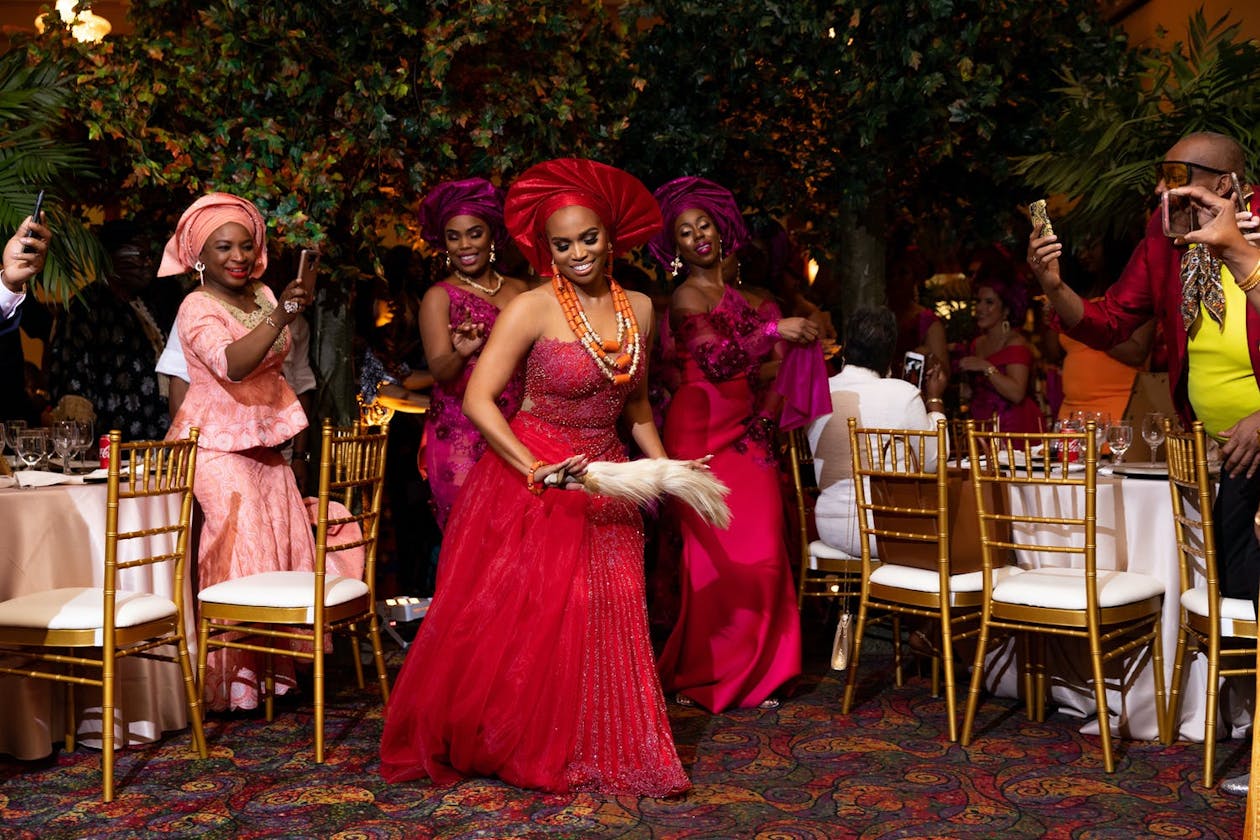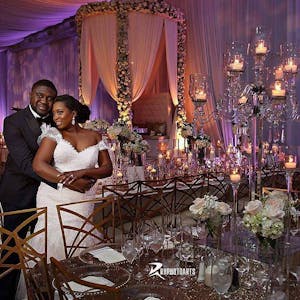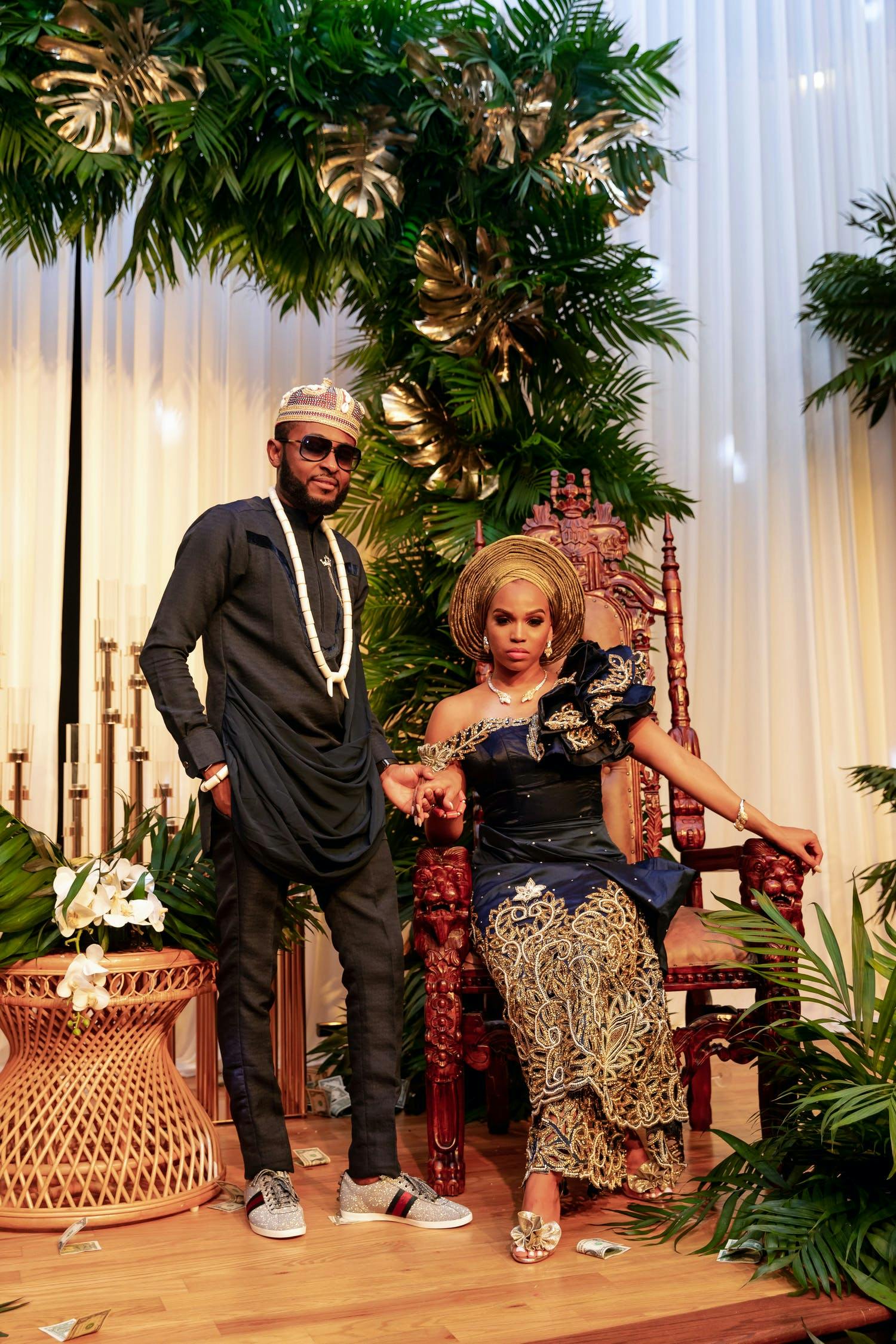Nigerian weddings may be known for their colorful fashion and wow-worthy productions, but the real emphasis is always on family. Renowned Nigerian wedding planner Chioma Adure Nwogu-Johnson of Dure Events tells us, “The typical Nigerian family prepares for their child’s wedding from birth.”
A traditional Nigerian wedding features meaningful rites that incorporate the couple’s heritage and family traditions. Of course, with over 200 ethnic tribes, you can expect to find many different Nigerian wedding traditions. “Every tribe is distinct, but also related,” Chioma shares.
Regardless, all Nigerian weddings are lively celebrations. From “spraying money” to colorful and over-the-top décor, each celebration is designed to impress. We sat down with Chioma to learn the ins and outs of a Nigerian-American wedding celebration — along with expert planning tips to ensure a successful event.
Whether you are a guest hoping to learn more about an upcoming wedding or a couple looking to incorporate important traditions, keep reading to discover more about this beautiful cultural celebration.
Meet the Expert

We love how Dure Events curates each and every detail to create a full-sensory experience that elevates life’s most meaningful moments. Their one-of-a-kind, exquisite celebrations — from intimate gatherings to luxury destination weddings — are always creatively driven and flawlessly produced.
What to Expect at a Nigerian Wedding

A Nigerian wedding will reflect the unique customs of the couple’s tribe. More well-known tribes include the Igbo, Yoruba, and Hausa tribes, each with its own traditions.
Many Nigerian-American weddings traditionally feature two ceremonies: the traditional wedding and the formal wedding. The traditional wedding will differ based on where in Nigeria the couple’s family is from. “Everyone has their own traditions and cultures that must set them apart. That’s what makes Nigerian weddings so beautiful,” Chioma shares. “You get to stand by who you are and where you’re from.”
Couples who come from different tribes must honor both sides of their family heritage. As a result, weddings are also an opportunity for different tribes to learn more about each other. However, “Wherever the bride resides is where the traditional wedding is supposed to take place,” Chioma says.
Chioma goes on to share some unique Nigerian wedding traditions:
The Bride Price
Almost all Nigerian tribes expect the groom to pay a bride price before marriage. This “price” is a list of valuable items that can range from livestock and dishware to luxury vehicles. While these items are supposed to prepare the bride for her new home, they also represent the invaluable wealth that the daughter brings to her parents.
Chioma explains that women are very valued members of Nigerian society; the bride price is expected to reflect this. In fact, a bride with higher education will often receive a higher bride price.
For members of the Igbo tribe, grooms (along with their older male relatives) are expected to “knock on the door” of the bride’s home and ask her parents for permission to join their family. After the bride accepts the offer, the family will then come up with the bride price. Only after the terms are accepted can the traditional wedding take place.
Traditional Wedding
The traditional wedding follows the wedding customs of the family’s tribe. While a traditional Nigerian wedding will take place at the bride’s family home, it’s still essential to incorporate and honor the groom’s heritage as well. Here are some Nigerian wedding traditions you may encounter at a Nigerian-American wedding:
The Wine Carrying: At Igbo weddings, the bride receives a cup of wine from her parents before she’s been given a glimpse of her groom. With her maidens, she must go now and look for the groom who will be hidden within the crowd. Expect to hear male guests attempting to distract her with shouts and hisses as she begins her search! When she finally finds her husband, she will get down on her knees and present the wine cup. The husband must drink the entire contents and replace the empty cup with money.
Wedding Fatiha: Hausa weddings feature a distinct ceremony where representatives from the bride and groom’s family exchange vows for the couple. After the vow exchange, blessings are offered to the newly married couple.
The Prostration: At Yoruba weddings, the groom and his friends are required to lie down (or in more modern celebrations, bend) before the bride’s parents as a sign of respect.
The Lift Test: Similar to the Western tradition of carrying the bride over a threshold, a Hausa groom will carry his bride to the dance floor. This rite represents both his strength and ability to care for his new wife.
The Money Spray: As soon as the married couple hits the dance floor, guests will “spray” them with money — which symbolizes many blessings. The more times a couple dances, the more money they can expect to receive. Make sure to bring some cash to a Nigerian wedding to participate in this meaningful and fun rite. “Everybody has their own traditional music,” Chioma tells us, “but Afrobeats are always popular on the dance floor.” Additionally, other tribes in attendance will perform traditional dances for the couple throughout the reception — revealing the beauty and diversity of Nigerian culture.
The Food: While each tribe has their own distinct cuisine, they can all agree on the importance of food at a Nigerian wedding. Guests are expected to leave satiated, so you can look forward to lavish spreads and generous helpings.
Formal Wedding
The formal wedding often follows the timeline of a traditional Christian or Muslim wedding. Most brides wear a Western-style white wedding dress at this event. However, many couples (and event guests) may opt to wear traditional attire, especially if the traditional and formal wedding are combined into one event.
What to Wear to a Nigerian Wedding

“When you think about Nigerian weddings, you think about fashion,” Chioma tells us. A bride who experiences both the formal and traditional Nigerian wedding will average six to seven outfit changes. The bride will also boast bright makeup designs as well as bold accessories.
Of course, fashionable apparel extends far beyond the bride. The aso-ebi — color-coordinated family uniform — is an integral part of any Nigerian wedding. While some tribes have more elaborate aso-ebi than others, most cultures embrace the gele (hair tie) and aso-oke (fine, hand-woven cloth).
Certain tribes are known for wearing particular colors. For example, Chioma tells us how the Binis wear white and red aso-ebi. The bride’s favorite color may also determine the aso-ebi color palette.
“Having your family and friends be a part of the aso-ebi, with matching material in different and dramatic designs” is a meaningful part of any Nigerian wedding.
Either way, “The bride and groom have to stand out from both the crowd and party decorations,” Chioma shares. So if the traditional wedding color is purple, family and guests may wear any variation of that purple hue; but the couple must wear a color that “pops.”
She also tells us, “In the beginning, the groom may wear the traditional attire of the bride to show his acceptance of where she comes from.” However, the last outfit change for the bride will reflect the groom’s culture, representing her union with his family.
For weddings that incorporate the traditional wedding and formal wedding into one event, there are fewer outfit changes due to the shortened time. In that case, the bride will only have two outfits: the white wedding dress and one traditional outfit.
Guests can also participate in the wedding and feel a part of the festivities by wearing aso-ebi. Chioma encourages guests to find out the aso-ebi colors in advance.
*See Some of Our Favorite Aso-Ebi and Bridal Fashions from Nigerian Weddings:
How to Budget for a Nigerian Wedding

“We tend to believe that the more people you have at your wedding day, the more successful the wedding,” Chioma says. As a result, Nigerian weddings can have anywhere from 1,000 to 4,000 guests.
However, because venues and vendors in the states often charge per guest, the dynamic has changed. Now, Nigerian-American weddings often include an average guest count of 250 to 350.
Since the pandemic began, average costs have also increased. “Things have gone up 35-to-45 percent,” Chioma explains. Consequently, more couples are opting to combine the traditional and formal wedding into one event. “It gives guests a chance to be a part of the traditional wedding without them having to travel twice.”
Having two weddings in one also cuts down on costs for the couple and their family. “All you have to do is pay for your second outfit, and maybe some Nigerian food for later in the evening,” Chioma says.
Still, Chioma advises couples who opt for one event to still perform the traditional rites, such as the “knocking on the door” with intimate family members. Honoring your culture and family heritage is an integral part of any Nigerian wedding.
However, couples who do choose to go ahead with two separate events can often save money by using the same vendors for both celebrations. Chioma explains that vendors will often give couples 25-to-50% off for the double booking. Also, because the traditional wedding allows family members to contribute to the budget, the couple may decide to spend most of their budget on the formal wedding.
How to Incorporate Nigerian Wedding Traditions into a Modern Celebration

While many of Chioma’s couples may never have visited Nigeria, it’s expected that some part of the wedding celebration will take place in Nigeria, specifically the village where the family comes from. For couples who are unable to travel to Nigeria for the traditional wedding, they can perform certain rites, such as the “knocking on the door” in absentia or through Zoom. “They still have to honor the land where the bride comes from in Nigeria,” Chioma tells us.
If the couple chooses to go to Nigeria for the traditional wedding, the formal wedding will often take place a few months later. However, this has become less popular due to the pandemic. “People are not willing to travel multiple times and things have become too expensive,” Chioma shares. Consequently, a popular alternative is to do both weddings on the same weekend. For example, a couple may have their traditional wedding on a Thursday, the welcome party and rehearsal dinner on a Friday, and the formal wedding on a Saturday.
However, the new trend is to combine the traditional and formal wedding into one event. “COVID-19 has forced couples to rethink travel plans as well as safety precautions. Traveling multiple times in a month or hosting multiple events is no longer as easy or realistic.”
So how can couples experience one celebration that still honors and incorporates their Nigerian roots?
Chioma recently planned a Nigerian-American wedding that followed the timeline of a typical Western wedding. The couple walked down the aisle, experienced a first dance, etc. However, the couple transitioned into their traditional wedding attire during the dinner reception. From there, the reception incorporated various Nigerian wedding traditions. “With the shorter time frame, everything is done at a faster pace than a traditional wedding,” Chioma tells us.
Of course, it takes a detailed and organized production flow to be able to incorporate two major events all in one day. “We have five hours to produce multiple events in one: ceremony, cocktail hour, reception, and a traditional Nigerian wedding,” Chioma explains. As such, it’s important to have a wedding planner who is knowledgeable about the couple’s culture — as well as skilled in time management and event production. Luckily for her couples, Chioma of Dure Events provides just that.
PEOPLE ALSO ASK
How Can PartySlate Help Me Plan My Wedding?
FIND A VENUE: Wedding venues book up fast. Find yours faster with PartySlate’s curated venue directory. Use the filters to narrow down your selection by location, venue type, guest count, and more.
FIND LOCAL VENDORS: Find talented party vendors to bring your wedding mood board to life. Use PartySlate’s vendor directory to discover everything from the best wedding planners and photographers to entertainment companies and florists. Make sure to use the side filters to narrow your search by vendor category, location, and more.
GET PARTY IDEAS & INSPIRATION: Sick of scrolling through Pinterest and finding dead end after dead end? PartySlate offers endless inspiration (without being overwhelming). Find the latest trends as well as classic ideas that never go out of style. With PartySlate, you can discover stunning photos in the wedding idea gallery, browse real wedding albums, and read helpful articles and advice.


